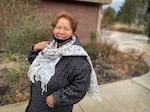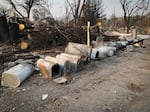Maria Meunier has lived in Medford for almost a decade. She owned a manufactured home at the Medford Estates — what was once a gated, manicured mobile home park with cleanly paved streets, sturdy homes and bright green lawns — until Sept. 8. That’s when the Almeda Fire raged through Jackson County, destroying 2,500 homes within hours.
Five months after the fire, the crumpled remains of Meunier’s house overlook an expanse of ashes and twisted metal. She and her adult son, who has disabilities, are living at a friend’s house as they search for housing amid a tight market and a severe shortage of affordable homes.
They applied for disaster assistance through the Federal Emergency Management Agency but were denied.
Related: A hint of future fire seasons, as Southern Oregon emerges from the ashes of 2020
“You are not eligible for housing assistance because you did not prove you lived in the damaged home at the time of the disaster,” Meunier reads from the letter FEMA sent her. “I’ve been there since August 2012! Who’s been paying the rent? Who’s been paying mortgage and property taxes?”

Maria Meunier lost her home to the Almeda Fire. She's been trying to get federal disaster assistance ever since.
April Ehrlich / JPR News
Meunier is among the nearly 14,000 Oregonians who were denied federal disaster assistance after last year’s wildfires, according to data provided by the agency. She’s also one of the few people who have appealed FEMA’s decisions. About 290 people in Oregon appealed FEMA’s denials. Only 40 of those were approved. Meunier wasn’t among them.
Meunier wants to go back home. She wants to live in the same park, in the same plot, in a similar house. The park is leasing plots on a first-come, first-served basis, without prioritizing previous tenants. New tenants will need to buy a home among a selection of designs provided by the park, and prices are going to be tens of thousands of dollars more than what Meunier paid nine years ago. She owned her previous home outright. It was easier to afford the monthly mortgage payments along with space rent when her late husband was alive.
Meunier guesses she’ll need another $30,000 to move back to the park. She’s not sure what she’ll do if she doesn’t make up that shortfall. Still, she plans to appeal FEMA’s denial a third time.
“I’m going to fight,” Meunier said. “Whatever it takes.”
Left out
Oregon’s high rates of denial are on par with previous natural disasters. FEMA denied about 60% of Puerto Rican disaster assistance applicants after Hurricane Maria. A study by Texas Hausers, a housing nonprofit, found that FEMA denied a quarter of disaster applicants after Hurricane Harvey hit there.
Many of the people who have been denied assistance are low-income. Among Hurricane Harvey applicants, people whose annual incomes were below $15,000 had a 46% denial rate. People with annual incomes exceeding $70,000 had a 10% denial rate.
JPR has a pending data request with FEMA to obtain income and demographic information about Oregon applicants who were impacted by wildfires in 2020.
Following Oregon’s wildfires, FEMA issued press releases encouraging people to appeal. They said the appeals process could be as simple as correcting a typo or providing a missing document.
Related: After wildfires, Oregon faces higher risk of landslides
Disaster victim advocates and legal aid attorneys say appealing FEMA’s denials is anything but simple; and that by denying so many people the first time, the agency is using a complex bureaucratic process to weed out people who likely need the most help.
“People who’ve been affected by a disaster are dealing with trauma,” said attorney Tracy Figueroa with Texas RioGrande Legal Aid. “They’re trying to pull the documents together, and just hearing “no” from one entity or another can shut things down. They don’t know how to navigate the bureaucracy. They’re just done.”
Figueroa and other legal aid attorneys say applicants almost always need an attorney to help them find and deliver documents, provide context for their living situations, and continually follow up with FEMA representatives.
People with limited resources are less likely to have access to a lawyer. Disaster-prone states like Texas, where Figueroa has worked through 18 federal disasters, have teams of legal aid attorneys that help low-income disaster victims. But in states like Oregon, which rarely sees a disaster as destructive as the Almeda Fire, there are few private or nonprofit attorneys who are experienced in FEMA disaster assistance.
FEMA’s denial letters aren’t always clear about how applicants can amend their applications. For example, several Oregon applicants told JPR that they were denied assistance because they have homeowner’s insurance; a common misunderstanding, since FEMA often lists homeowners insurance as a reason for denial. Rather, FEMA can help people with homeowners insurance, but those applicants need to follow a few other steps first. They need to see what their insurance will cover and provide that documentation to FEMA, then they need to apply for a loan through the Small Business Administration, even if they don’t intend to take out a loan. At that point, they could go back to FEMA with an appeal.

The 2020 Almeda Fire destroyed thousands of mobile homes in Jackson County, including the Royal Oaks Mobile Manor in Phoenix, Ore.
April Ehrlich / JPR News
Some applicants have also encountered language barriers, including Meunier, who primarily speaks Spanish. When she called the FEMA help line and asked for Spanish services, she received an English-speaking representative who used a translator located at a separate call center. They said they couldn’t transfer her to a Spanish-speaking FEMA representative; instead, they had to use a translator from the call center.
“They don’t realize, in the translation, a lot of things get messed up,” Meunier said. “You cannot literally translate spoken words.”
Data denials
When someone applies for disaster assistance through FEMA, the agency feeds their information through a third-party service, according to FEMA’s employee manuals.
If someone’s information doesn’t match up with that service’s database, it spits out a denial. People often receive eligibility determinations within hours of submitting their applications.
FEMA’s automated data verification can be problematic for people with unconventional living conditions. If someone was informally living out of a garage or a spare bedroom — or living in a mobile home with a title that never formally transferred to their name — they’re more likely to get denied assistance. If they have a Spanish name that is sometimes Anglicized or misspelled — or they have two last names that are sometimes hyphenated, sometimes not — they’re also more likely to be denied. It could get particularly tricky if a family includes undocumented parents with a child who is a U.S. citizen.
If there are multiple households living on a property — like roommates sharing a home, or multiple families in different buildings with the same address — only one of them could apply for assistance. If the same address gets multiple applications for assistance, they’re more likely to be denied.
Related: Climate change in Oregon by the numbers, from 0.1 to 200
These factors tend to leave out historically marginalized people with low incomes, said Sarah Saadian of the Low Income Housing Coalition.
“These programs are not designed to serve people with the greatest needs,” Saadian said. “And so, it’s unsurprising that we keep seeing these outcomes over and over again.”
The most common reason people are denied assistance in their initial applications is because of a clerical error or a missing document, according to FEMA spokesperson Jassiel Olivero Melo. She wouldn’t say if the agency was working on improving its disaster assistance applications to alleviate this common mistake.
“If the agency finds that there may be something in the application process that is causing applicants to fall short or needs some [interpretation], I am very sure the agency will improve it, if that’s the particular case,” Melo said.
Challenges with mobile homes
Jackson County officials say two-thirds of the homes destroyed by the Almeda Fire were manufactured homes. Like Meunier, mobile homeowners face a number of challenges in applying for disaster assistance. They need to provide months-long proof that they paid space rent, a copy of their lease agreement and a title to their home, which isn’t always available because of the generally informal process of buying a mobile home.
“For people who are living in mobile homes, they may not have those title documents,” Saadian said. “Even if your state may require you to register it, it just doesn’t happen like that. Sometimes the park owner might have it. Sometimes it’s never delivered when the home is delivered.”

An air tanker flies above south Medford to drop fire retardant onto the Almeda Fire as it tore through residential neighborhoods on Sept. 8, 2020.
April Ehrlich / JPR News
Saadian and the Low Income Housing Coalition are encouraging FEMA and Congress to enact legislation that allows mobile homeowners to self-certify homeownership in lieu of title documents, a process that had been allowed after Hurricane Maria hit Puerto Rico. FEMA only allows self-attestation in U.S. territories, not in the states.
Related: Detroit, devastated by fire, begins to rebuild
Mobile home parks have historically been located in areas that are susceptible to natural disasters, including wildfires and hurricanes.
“They’re in areas where wildfires occur and where flooding can occur because they’re tucked away,” said attorney Ilene Jacobs with the California Rural Legal Assistance. “Some of them are quite substandard and are in areas adjacent to a highway.”
The Almeda Fire burned through the Bear Creek Greenway, a riparian area and bike path running along the Interstate 5 freeway. Several manufactured home parks abutted the greenway and freeway before the fire raged through those properties.
Jacobs has spent years working closely with disaster assistance groups and legal-aid clients. She said every time there’s a disaster, the same patterns arise: High rates of denial, low rates of appeals and large numbers of low-income families falling through the cracks.
“These are lessons that we should have learned a long time ago and not learn every time there’s a disaster,” Jacobs said.

